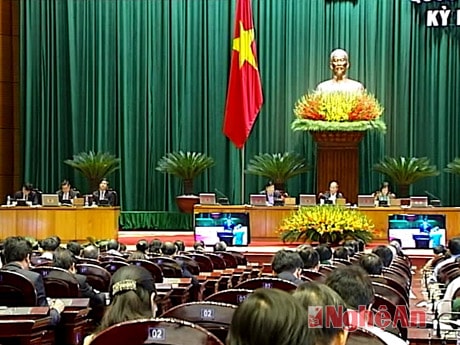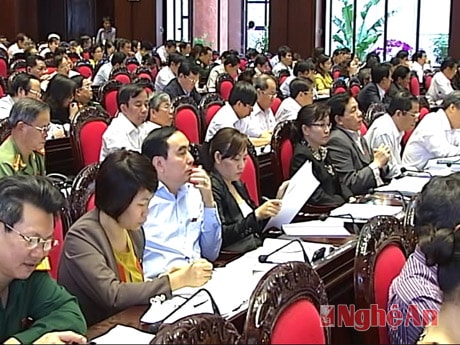Eliminate ineffective small hydropower projects
(Baonghean.vn) - On October 30, the 6th Session of the 13th National Assembly entered its 8th working day. The National Assembly worked in the hall to listen to the Government's Report on the master plan of hydropower projects; the Submission on amending and supplementing Resolution No. 38/2004/QH 11 dated February 3, 2004 of the National Assembly on the investment policy for the construction of Ho Chi Minh Road; the Report on explaining, accepting and revising the draft Law on Bidding (amended) and discussed in the hall on the draft Law on Bidding, which still had many different opinions.
 |
| Scene of the 8th working day at the National Assembly hall |
Minister of Industry and Trade Vu Huy Hoang presented the report on the master plan for hydropower. Accordingly, the country currently has 815 hydropower projects and works, 268 projects with 14,240 MW are in operation, 205 projects are under construction and expected to be exploited from now until 2017 are 6,198 MW.
According to the Government's Report, up to now, localities with hydropower projects and works across the country have had their planning reviewed and the review results have eliminated 424 projects, not considered for inclusion in the planning of 172 potential locations, temporarily suspended 136 projects, and continued to review and evaluate 158 projects.
Regarding the quality of hydropower planning, especially small hydropower, the Government report said it is still limited. Because most small hydropower projects are prepared by localities and submitted to the Ministry of Industry and Trade, they are not feasible and must be adjusted in scale during the investment process. The number of small hydropower projects is large, but their contribution to power generation capacity is too small. Therefore, about 34% of the total number of small hydropower projects must be removed from the planning. The reason for the removal of small hydropower projects is their negative impact on the environment and local socio-economic development.
 |
| Delegation of Nghe An province on the 8th working day |
In addition, the inspection and supervision by local authorities are not regular and timely, especially in the stages of investment decision, project establishment and appraisal. Responsibility and coordination in the process of building and implementing hydropower planning are not clear. In addition, the current small hydropower planning does not really pay attention to the goal of using water resources as well as environmental protection.
In the review report of the National Assembly's Committee on Science, Technology and Environment, it pointed out the limitations of the hydropower system, especially small hydropower, such as: small hydropower projects are fraught with unpredictable risks. Nearly 30% of dams have not been inspected, 66% of dams do not have an approved protection plan, nearly 55% of dam owners do not have a flood prevention and control plan. The working efficiency of the monitoring system at some hydropower projects is very low. The development of a flood prevention and control plan for the downstream area in the event of an emergency flood discharge or dam break has received little attention.
The reasons for the above shortcomings are that many investors of small hydropower projects have limited professional capacity and finance; regulations on sanctions for violations of dam safety and dam inspection; roles, responsibilities, and coordination between state management agencies and investors have not been issued promptly, clearly, and have not been fully implemented. In addition, information and data on natural conditions are often incomplete and lacking updates due to limited investment resources for the investigation and survey phase of the project area.
More transparency in bidding is needed.
On the 8th working day, in the afternoon, the National Assembly continued to work in the hall and discussed a number of contents with different opinions of the draft Law on Bidding (amended).
The draft Law on Bidding (amended) has 13 chapters with 95 articles. At the discussion, most opinions agreed with the provisions in the Law on specific limits on state capital. There were opinions suggesting clarifying the basis of the ratio of 30% of state capital and regulations on the scale of state capital for investment projects using state capital at an absolute level in cash of 500 billion VND. It was proposed to lower the ratio of state capital in the total investment level, and to regulate the state capital level lower because 500 billion VND is very large. Second, regulations on the selection of contractors to implement development investment projects of state-owned enterprises are within the scope of the Law and do not depend on the source of capital, because the development investment capital of state-owned enterprises is also state capital. Reality has shown that if state-owned enterprises borrow and cannot repay their debts, the state must eventually have a solution.
There are opinions suggesting clearer regulations on the relationship between contractors and contractors, contractors and investors to ensure fair competition in bidding. Other opinions suggest adding specific regulations on the relationship between authorized individuals of contractors and authorized individuals of investors, investment decision makers and individuals with related personal relationships. And some opinions also suggest that it is necessary to add preferential regulations for bidding documents of contractors using a certain percentage of workers who are war invalids or disabled people. Notably, many opinions of delegates suggest that it is necessary to strictly regulate and limit bidding appointment, but only apply bidding appointment in cases where it is necessary to overcome the consequences of natural disasters, in emergency situations such as broken dikes, traffic jams, broken water pipes, oil pipes, etc.
Regarding the issue of bidding, there are opinions suggesting not to stipulate a limit on bidding because such a regulation can be exploited to assign bids by dividing bid packages. Bidding must be separated from the investor and transferred to an independent, professional bidding organization to thoroughly and fundamentally handle negative practices such as collusion, "blue team, red team" as has been happening for a long time.
Regarding the issue of bidding for the purchase of drugs, chemicals, supplies, and medical consumables, due to the special and important nature of these items, a separate section is needed to avoid the exploitation of loopholes for collusion and profiteering. However, because the bidding for drug supply in practice has only been implemented for more than a year in the form of a joint Circular between the Ministry of Health and the Ministry of Finance, the draft Law only stipulates some principles on drug purchase using state capital, health insurance funds, and other legal sources of revenue of public health facilities based on the initial results of drug procurement bidding according to current regulations. For drugs with few manufacturers, original brand-name drugs, rare drugs, drugs under copyright, drugs that have been used stably for a long time, and some other special cases, the selection of drug suppliers is also carried out through price negotiations.
At the end of the discussion session, the National Assembly Standing Committee directed the drafting agency to absorb, review, and adjust the layout and wording to complete the Law on Bidding (amended) before it is approved by the National Assembly.
Nguyen Nam






